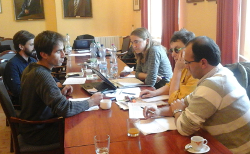Promoting integration of agroecological knowledge

The pedagogical methods or tools that we recommend for real appropriation of agroecological skills with respect for the learner correspond to three paradigms which are partly inspired by the typology put forward by Ian Morris Robottom and Paul Hart (1993) but for which we propose an adaptation as follows:
1. an objectivist paradigm where the trainer takes a position of expert, notably when this concerns promoting the learning of stabilised and recognised scientific which is not the object of controversy,
2. a subjectivist paradigm where the trainer chooses a position of accompaniment; it leads the learner to envisage the relation with his/her environment as an intrinsic part of his/her being, to appreciate the personal values at play in the construction of agroecological skills,
3. a socio-critical paradigm where the social pressures that influence our choices are taken into account; the trainer seeks the emancipation of the person through approaches that encourage a critical thought process.
In our conception of the interactions / transactions between knowledge and the real context, we choose not to refer to â??teacher' or â??trainer' but rather that of leader of the transmission, as a person capable of juggling between different positions: the position of expert, accompanying person or facilitator.
We don't wish to question the position of expert, which is justified when the learning of agroecological skills or practices is recognised by the scientific world and agricultural professionals. Through the procedures of showing, demonstrating or experimenting, the expert adds to these by introducing reasoning or ad hoc observations.
However, the subjective, controversial and contextualised dimensions of a wide number of agroecological skills requires us to add two further positions to the position of expert: accompanying person and facilitator.
It is delicate to define the notion of accompanying person outside the consensual framework. Counselling, sponsorship, mentoring, companionship, tutoring, coachingâ?¦ are all similar concepts. Independently of the term chosen, it is based on the principal of providing assistance.
We limit our definition to a position of mediation between a problem and/or controversial, implicit or contextualised skills, and the learner. The accompanying person preferably takes a position that enables development of personal experience and opening of the mind to the various possibilities related to agroecological skills or towards the resolution of complex situation-problems for which there is never a simple solution.
The facilitator has a position of mediation between individuals through debates on problems or situations. But unlike the accompanying person, this is less related to solving a problem than authorising, even encouraging, the confrontation of divergent points of view and stimulating argumentation as a lever for learning.
We acknowledge that it may be difficult to distinguish between and therefore adopt the positions of accompanying person and facilitator. However, both exclude a position of authority for the trainer as conveyed by the dogmatic conception of transmission. They are based on approaches that favour the reflexivity (1) of the learner, which we envisage as one of the major levers for training and learning.
(1) By reflexivity, we understand the approaches that enable us to use experience in order to distance ourselves from it and draw upon this position to develop new meanings.
Furthering your discovery of training itinerary :
@ Position of trainer as an expert or objectivist paradigm@ Position of accompaniment or subjectivist paradigm
@ Position of trainer as a facilitator or socio-critical paradigm
@ Combining different positions
@ How to evaluate integration
@ Exploring agroecological knowledge

